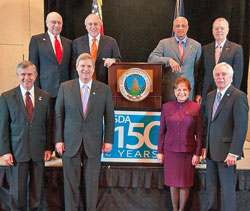By opening new markets in Japan, Vietnam, and other countries, we are giving our producers access to new customers and expanding their sales. These sales will generate more farm production, and related activities, that will grow the U.S. economy.
The letter from the former secretaries follows:
As former Secretaries of Agriculture, we have been personally invested in the negotiation of every major U.S. trade agreement of the past 40 years. We know from experience how important such agreements are to the economic well-being of our farmers and ranchers. In every negotiation where agriculture has been on the agenda these negotiations have expanded our markets, boosted farm incomes, and in the process created new jobs, both on-farm and off-farm, in rural America.
The recently concluded Trans Pacific Partnership (TPP) negotiations are in that same mold. TPP, a high-standard, 12-country agreement, represents this nation’s “rebalance toward Asia,” which fits American agriculture perfectly. That’s where populations are increasing, as is purchasing power, and that’s what dramatically enhances the demand for our food. We will in the future benefit significantly from increased access to those markets.
We have long had aspirations to sell more of our products to Japan, and we’ll now have that enhanced opportunity. But TPP also opens up new markets in the growing economies of Vietnam and Malaysia. And it even provides additional access to Canada’s poultry, egg and dairy markets.
TPP is a 21st-century agreement that sets enforceable “rules of the road” for trade throughout the region, and with countries currently representing over 40 percent of the global economy. But it is also meant to be an open platform for other countries to potentially join, over time, if they are willing to meet the high standards set forth in the agreement, and if we and the other TPP members—and our own Congress—confirm they can meet that bar. That means potential future agricultural export opportunities could open up within the region.
The secretaries concluded the letter saying there is no downside to TPP.


